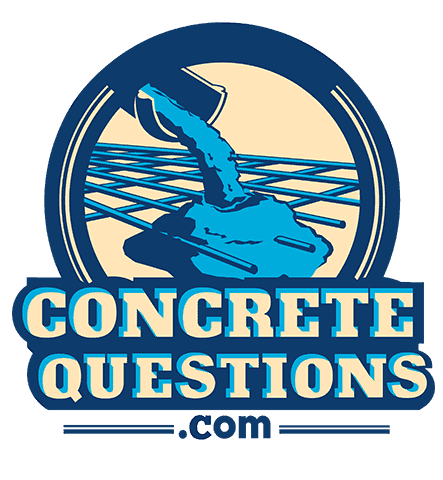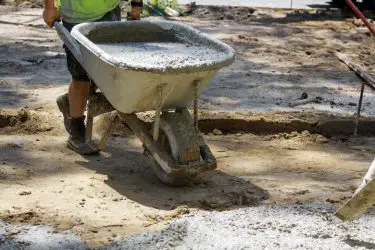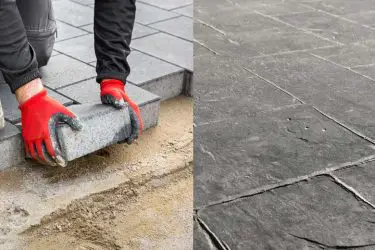One of the most important things about concrete is that it needs frequent maintenance. Since concrete is porous, it becomes increasingly difficult to remove stains from oil spills, grease, or paint. These might seem permanent and impossible to remove. However, it is definitely possible to clean stains off the concrete with cheap and eco-friendly products.
Cleaning any stain off concrete is possible with a variety of methods and products found around the house such as using a pressure washer or vinegar. For the removal of stronger stains, more aggressive products or chemicals may be required such as bleach, degreasers, or hydrochloric acid.
Concrete that is installed outside is almost always at the mercy of the elements such as sunlight, snow, and spills. The list below details methods or products that you can use to clean the stains from concrete surfaces such as a driveway, garage, or patio.
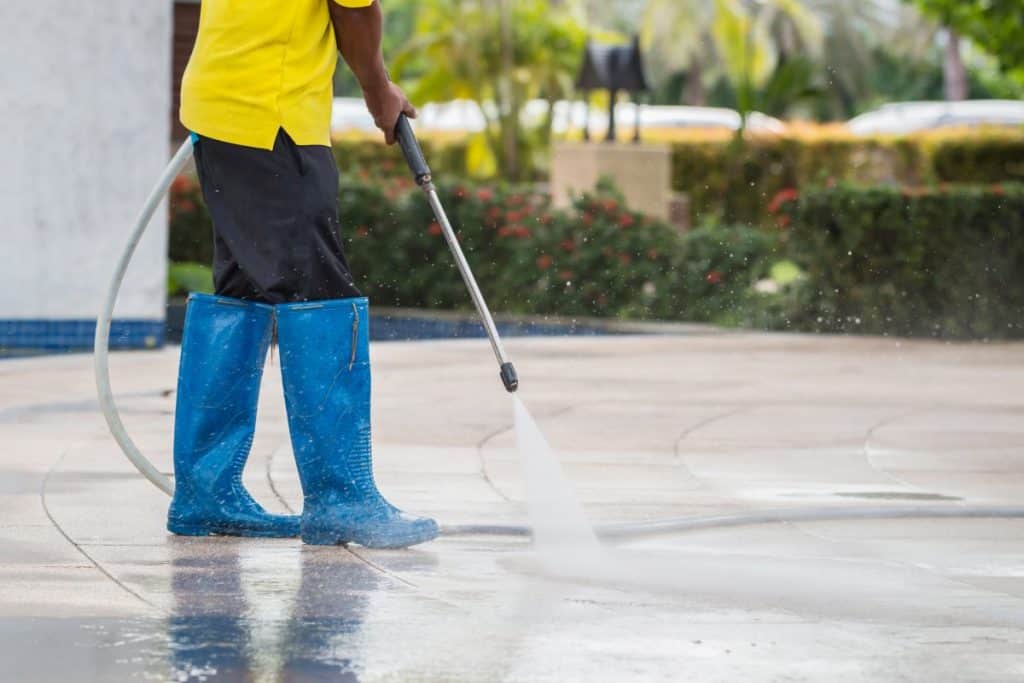
Table of Contents
Pressure Washer
One of the most common ways anyone might clean up a mess on concrete is to use water. It’s easy to get because it’s one of the most abundant resources on the planet, and it’s not a chemical that can hurt the environment. Quite the opposite, actually.
Whether that water is from the hose or a pressure washer can determine whether or not it will help get out tough stains in the concrete.
Because concrete is so porous, high-pressured water sprayers can get water down into places where dirt stains lurk. The washers come in all shapes, sizes, and prices – anywhere from $90 to $1,200, but renting one from a local shop may be cheaper in the long run. Most washers are rented out for anywhere between $40 to $100 per day. Most run on electricity or gas pressure.
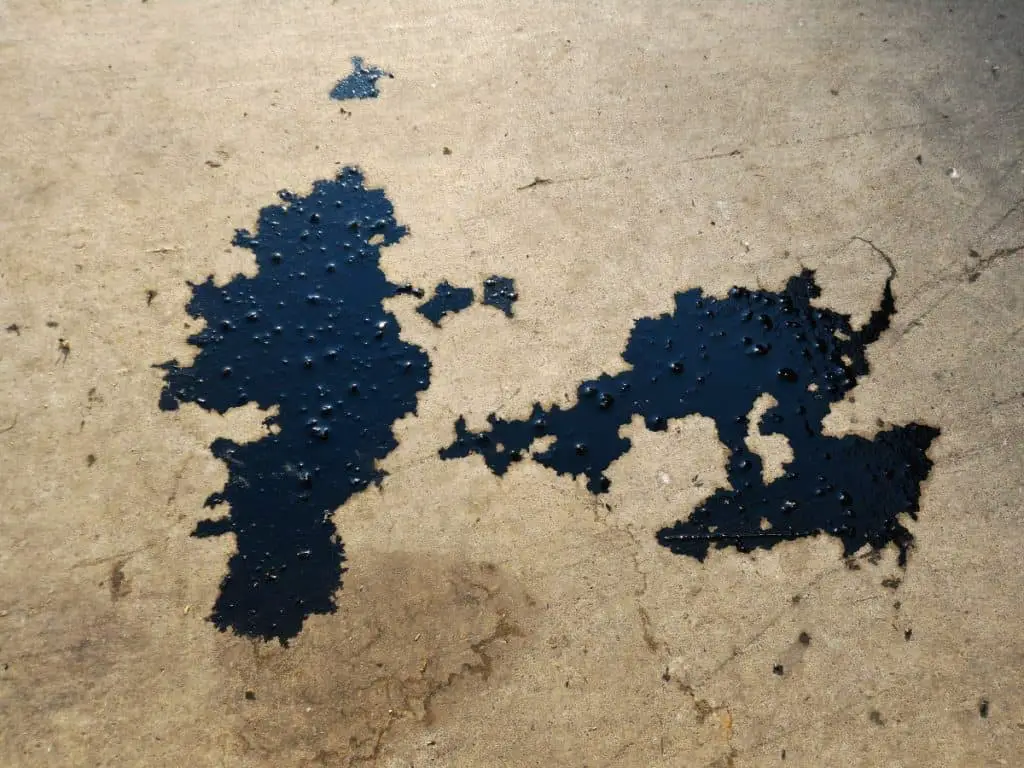
Pressure washers are usually used in combination with one or more of the items below on this list. Even though just water could remove some stains, it’s more likely that you’ll also need some type of concrete stain remover for the vast majority of stains.
One great example is Oxy Solve Concrete and Driveway Pressure Washer Cleaner from Simple Green! (Available at Amazon.com)
However, one downside of pressure washers is that they tend to damage and can leave marks in the cement if their pressure is too high or if the concrete is not strong enough. Trying the other methods first with low-pressure water may achieve the results you desire.
Vinegar, Baking Soda, Or Lemonade
All three of these items do a good job of cleaning milder grease and dirt stains.
Both vinegar and lemonade are acidic, which is a key component of removing grease from the porous concrete.
Most vinegar and lemonade mixes have a pH level of 2 to 3, which is perfect for mild or new spills. This makes vinegar and lemonade more than 10,000 to 100,000 times more acidic than normal water. The best kind of vinegar to use for general household cleaning is white distilled vinegar, which has a pH of 2.5.
Baking soda is a mild alkali (basic, not acidic) and can dissolve dirt and grease when mixed with warm water.

Baking soda, also known as sodium bicarbonate (NaHCO₃), has a pH of about 8.3. Mix it with vinegar, lemonade, or warm water, and let it sit on the stain for a few minutes, allowing it to soak. Use a brush to scrub it then wash it away with water. This can provide just enough acidity to dissolve and clean up stains from the porous surface of the concrete.
Sodas & Carbonic Acid (H2CO3)
Sodas are a great cleaner to use to remove grease stains in your concrete. Soda contains sugar, phosphoric acid (H3PO4), citric acid (C₆H₈O₇), and carbonic acid (H2CO3). This last kind of acid is formed when carbon dioxide dissolves in water and makes it bubbly. All sodas contain carbonic acid to give it the pleasant fizz you feel when you drink one.
Apart from cleaning stains off the concrete, carbonic acid, when mixed with salt, can also help remove tarnish from copper and break down the build-up of “limescale,” which is made mostly of calcium carbonate (CaCO3), another ingredient of cement. However, it won’t damage the concrete after it has cured and hardened.
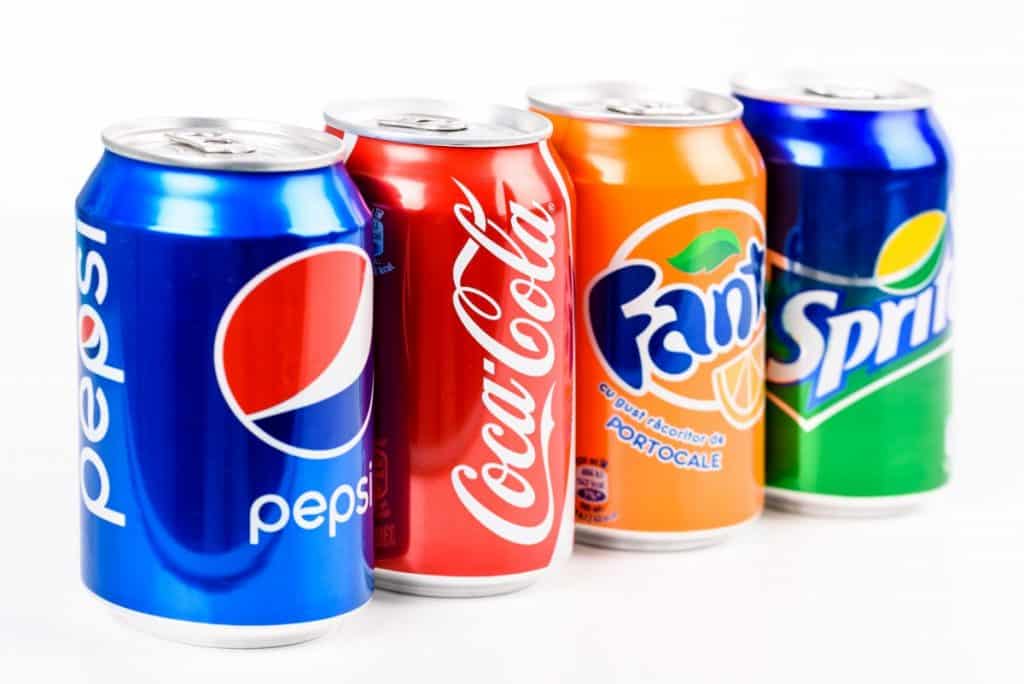
Allow the soda to sit and absorb into the concrete for a half-hour on moderate spills. You can use a brush and water to scrub and wash it away, or use other heavy-duty cleaners as well, such as detergent.
Detergent
Most detergents are readily available in most homes and are another go-to cleaner for concrete stains. However, not all detergents are created equally, and some are better for cleaning exterior concrete than others. When it comes to removing organic stains (natural oil, urine, leaf stains, pine cones, etc.), using a detergent that’s specifically designed to remove those kinds of stains is ideal.
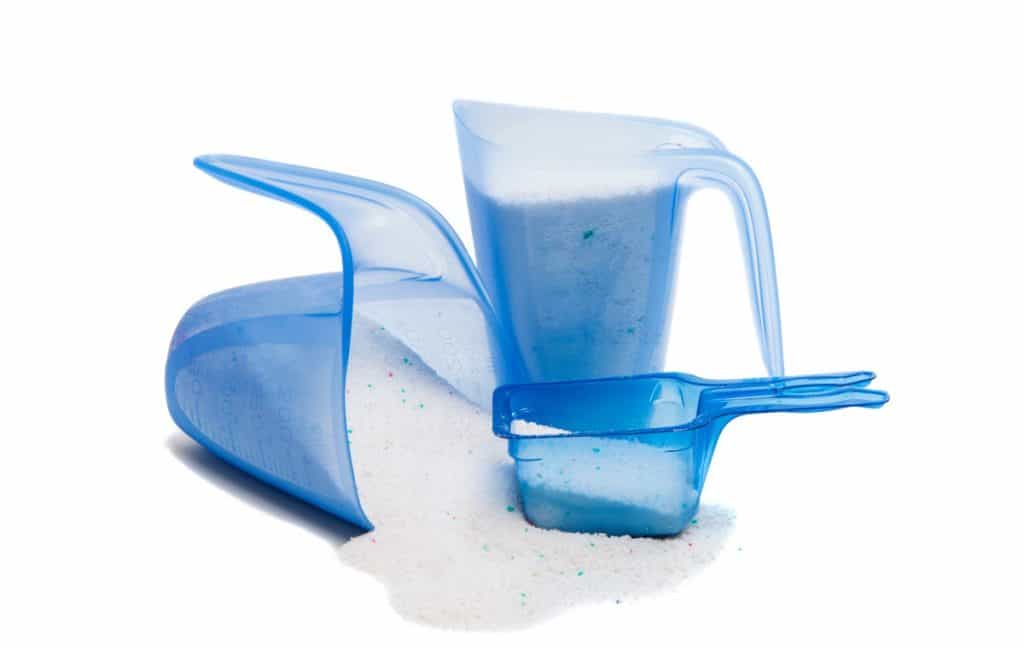
Unfortunately, cleaners like soap, cleaners, or acid will have a tougher time removing organic stains. You will need organic detergents like OxiClean, which has sodium percarbonate (Na2CO3·1.5H2O2) as its active ingredient. These types of detergents break down easily in the environment and get rid of organic stains.
Citrus-based Solvent Or Potassium Hydroxide (KOH)
One of the most difficult stains to remove from cement comes from paint. If you find yourself needing to clean graffiti off the concrete, then one method would be to use citrus-based solvents (a liquid that can dissolve other substances). They are the safest and most environmental-friendly paint thinners on the market. However, they may not always remove all paint.
Citrus Solvent by Milk Paint is one of the higher-rated brands that can replace petroleum-based solvents. It’s made from 98% pure citrus peel oil that was extracted from oranges, and 2% water. It breaks up easily in the environment and it’s not toxic if ingested or inhaled.
For the most stubborn paint stains, you should definitely try the Sprayway Graffiti Remover!
On the other hand, potassium hydroxide can be used to remove paint. Just let it soak into the surface for 4 to 5 hours before cleaning with a power washer. Potassium hydroxide is toxic and can cause irritation in the nose and lungs and can lead to pulmonary edema (the build-up of fluid in the lungs). It can also be deadly to aquatic animals.
But do you want an environmentally friendly cleaner with low odor, you should try the Dumond Smart Strip Advanced Paint Remover.
Also read: 10 Best Ways To Remove Paint From Concrete Floors
Alkaline Degreasers
The pH scale is an important scale to know when learning the difference between a “cleaner” and a “degreaser.” On the pH scale of 1 to 14, the lower the number is, the more acidic the cleaner. The higher the number, the more alkaline (basic). Most general-purpose cleaners/degreasers fall in the “neutral” zone between 6 and 8.
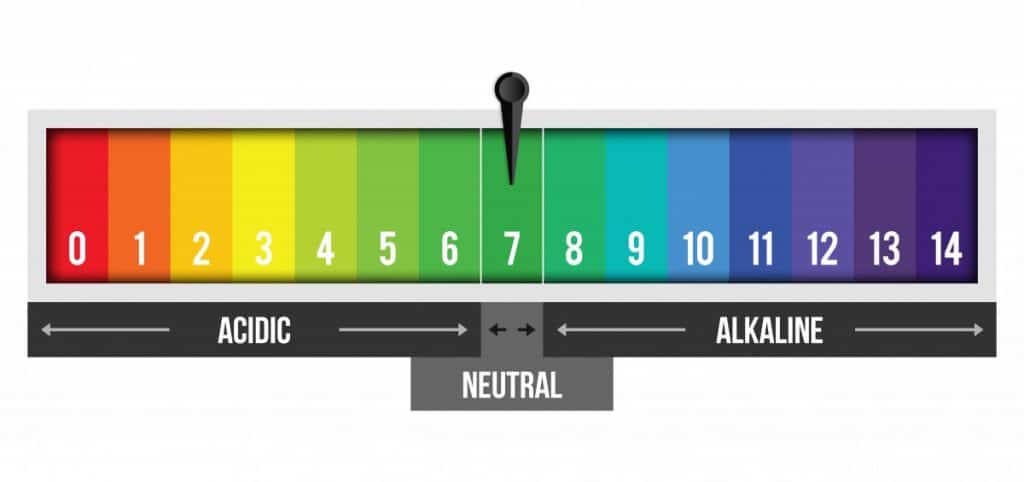
Degreasers can fall on the neutral to the highly-alkaline side of the pH scale. The more environmentally friendly degreasers are water-soluble and fall in the neutral to the mildly-alkaline range (between 6 and 10). Heavy-duty degreasers follow in the 11 to 13 range. The more industrial degreasers, such as oven degreasers, fall at the highest end of the scale, between 13 and 14.
Alkaline degreasers can remove petroleum oil, grease, and soot from concrete. First, pour hot water onto the stain. Then, apply the degreaser that is best suited for the type of stain. The water will lift the oil from the concrete while the alkaline degreaser will emulsify it. Wash away the oil and degreaser and scrub if needed.
Oxalic Acid (C2H2O4)
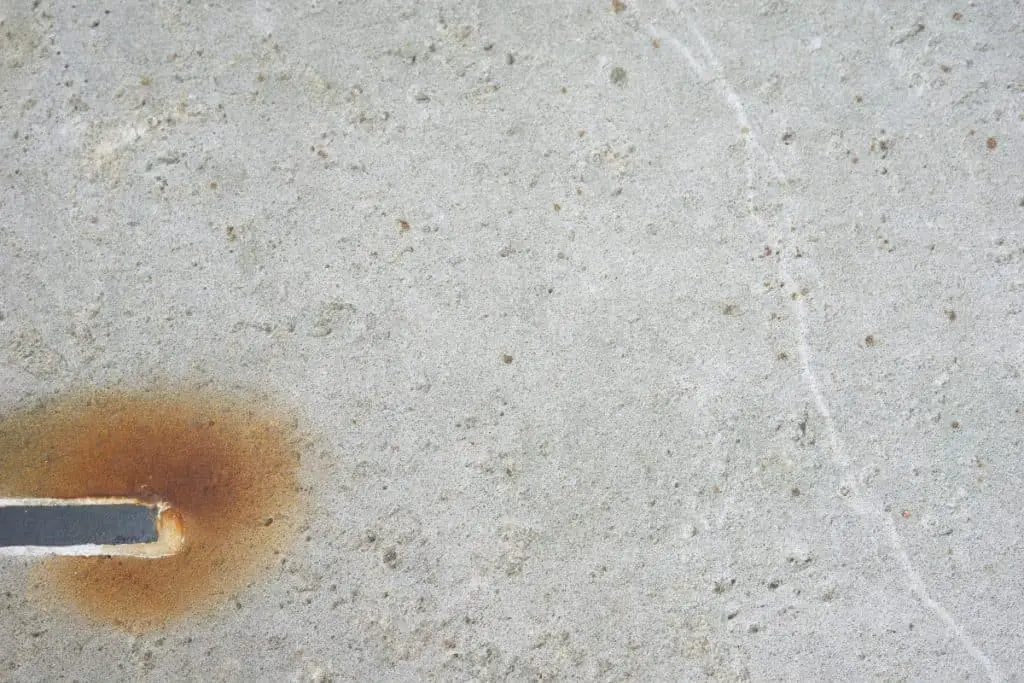
Cleaners use oxalic acid to convert insoluble iron compounds into soluble ions. In other words, oxalic acid is very good at dissolving rust stains from concrete. In reality, any acid cleaners may be used to remove rust stains, but oxalic acid is specifically used as a commercial rust remover. Rust dissolves very quickly in it.
Oxalic acid, also known as “oxalate,” is also naturally found in foods such as beet greens, rhubarb, spinach, beets, kale, and cocoa powder. Oxalate is harmless to most people, however, individuals who have too much of it in their diet tend to have an increased chance of health problems such as kidney stones.
Apply the cleaner containing the oxalic acid with warm water to the rust stains and scrub with a brush. It’s always best to follow the instructions that come with the cleaner and to protect yourself with hands with gloves and eyes with goggles.
One really good rust remover for concrete surfaces is the Singerman Laboratories Rust Remover.
Bleach
Almost everyone has this common cleaning product in their home. There are only two types of bleach: chlorine bleach and oxygen bleach. Chlorine is the most common and what we’re used to when we see the word, “bleach.” Oxygen bleach is not as strong as chlorine bleach and is used as color-safe laundry cleaner.
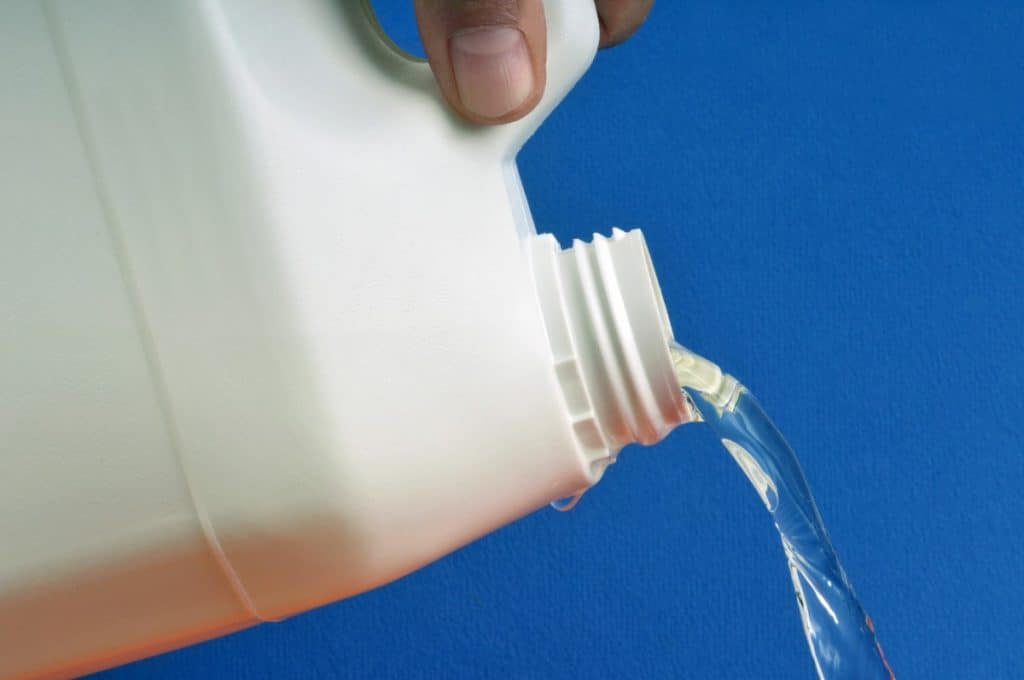
Normal chlorine bleach has a pH level of 11 while concentrated bleach can have a pH level of around 13. It is very corrosive and can burn the skin on contact. However, bleach is a great product for killing bacteria, fungi, mold, and mildew in your concrete.
Mix 1 part bleach with 1 part warm water and then pour or spray the solution onto the stain. Let it sit for 5 to 10 minutes before scrubbing and washing away. Chlorine bleach is unfortunately hazardous for both humans and the environment. It has also been linked to ozone depletion. Use with caution and awareness.
Muriatic Acid (HCL)
This is a more pure and dangerous form of hydrochloric acid. Products with this have a pH level between 1 and 2 on the scale. That means it’s even more acidic than normal hydrochloric acid. It can be used to clean coolant, petroleum oil, and other stains from garages or driveways.
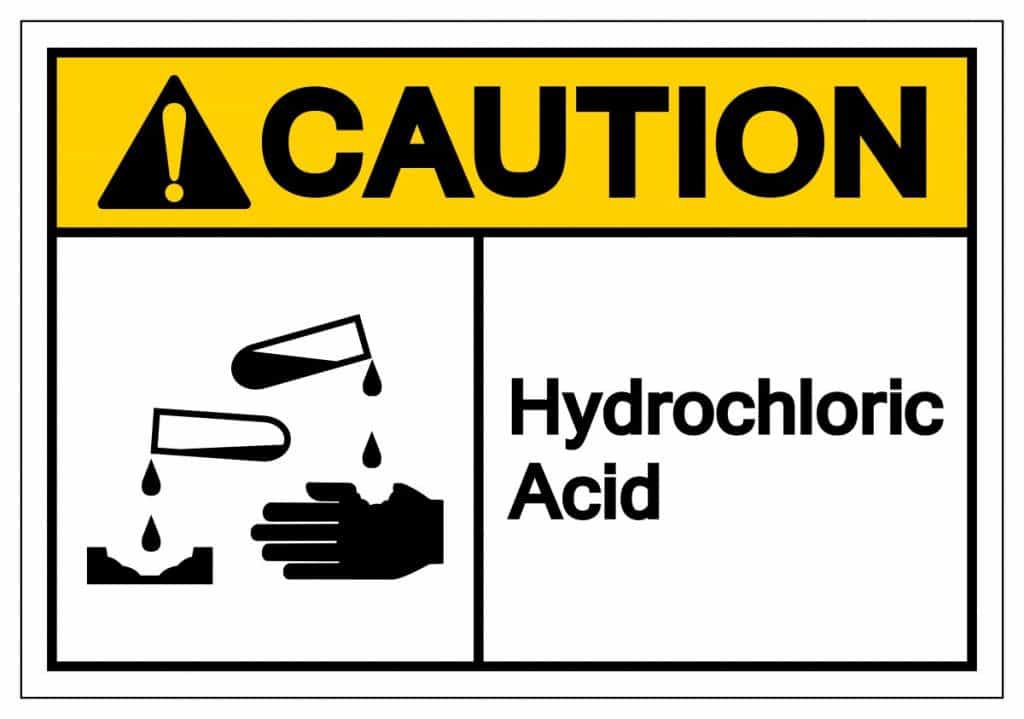
If you need to use this, add 1 part muriatic acid to 3 parts water. Use this with extra care, and always add it to water instead of the other way around. Adding water to muriatic acid could cause an explosive chemical reaction. Spray the solution to the stain and leave for 20 minutes. After, hose down the surface with lots of water.
Muriatic acid can harm humans and the environment – especially gardens where it can leak into the soil and acidify the plants. Use at your own risk and only when all other options have been tried.
